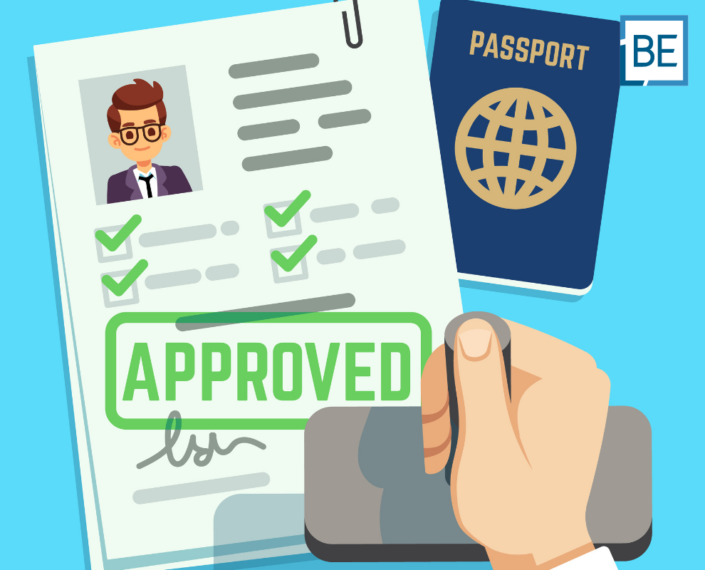Visas
Le rapport de 90 jours en Thaïlande
12/01/2023
Le visa non-immigrant B de 90 jours est requis pour les étrangers qui souhaitent entrer en Thaïlande pour y travailler. Le visa initial de 90 jours peut également être prolongé (chaque année) pour une durée d'un an, ce qui permet aux étrangers employés de vivre en Thaïlande aussi longtemps qu'ils sont employés.
L'obtention d'un visa non-immigrant B est également nécessaire pour obtenir permis de travail.
Cet article examine ce qu'est un visa non-immigrant B et la procédure à suivre pour l'obtenir.
.
Points clés
- Le visa non-immigrant B de 90 jours est requis pour travailler en Thaïlande.
- Ce visa initial peut être prolongé chaque année pour une durée d'un an.
- Un visa non-immigrant B est aussi requis pour obtenir un permis de travail.
- Dépasser la durée de validité du visa est illégal et peut entraîner des amendes et une interdiction d'entrée.
Qu'est-ce que le rapport de 90 jours en Thaïlande ?
Le visa non-immigrant B de 90 jours est destiné aux étrangers venant travailler ou faire des affaires en Thaïlande.
Après l'obtention du visa, ils ont 90 jours pour entrer dans le pays.
Une fois sur place, ils doivent demander un permis de travail. Si moins de 30 jours restent sur le visa, ils peuvent le prolonger d'un an sans quitter la Thaïlande, en s'adressant au département de l'immigration.
La procédure de prolongation des visas se déroule en Thaïlande auprès du service d'immigration compétent, et le demandeur n'a pas besoin de quitter la Thaïlande.
Quelles sont les conditions pour obtenir un visa non-immigrant B ?
Pour obtenir un visa de non-immigrant de 90 jours, il faut généralement faire la demande hors de Thaïlande, souvent dans le pays d'origine du demandeur.
Les conditions requises pour demander ce visa sont les suivantes :
- Un passeport valide pendant au moins six mois à partir de la date prévue d'arrivée en Thaïlande.
- Une lettre d'invitation ou de confirmation détaillant l'objet du voyage, émise par l'organisation concernée.
- Les documents supplémentaires requis par l' ambassade ou le consulat royal thaïlandais compétent.
- Frais d'ambassade.
Pour les ressortissants occidentaux en Thaïlande souhaitant éviter un retour dans leur pays d'origine pour obtenir un visa Non-B, des destinations comme Singapour, la Malaisie ou le Cambodge sont souvent privilégiées.
Il est également possible de demander un visa Non-Immigrant B directement auprès du bureau de l'immigration thaïlandais, à condition de disposer d’un visa touristique (TR) ou d’une exemption de visa en cours de validité (avec au moins 15 jours restants). Cependant, cette option est moins courante en raison des exigences administratives plus strictes, telles que la présentation du formulaire WP3 (une pré-approbation du permis de travail), qui est obligatoire en Thaïlande mais non requis à l’étranger. La réussite de cette démarche dépendra de la capacité de l’employeur ou de l’entreprise à fournir tous les documents nécessaires dans les délais impartis.
Quelle est la procédure pour demander un visa de non-immigrant de 90 jours ?
Étape 1 : Remplir le formulaire de demande (formulaire TM 47) et préparer les autres documents requis.
Étape 2 : Soumettre les documents nécessaires à l'ambassade ou au consulat thaïlandais dans votre pays d'origine (certains pays proposent également un système de visa électronique avec des documents téléchargeables sur leur site web).
Étape 3 : Payer les frais d'ambassade ou de consulat.
Étape 4 : Attendre que l'ambassade ou le consulat examine et traite la demande de visa (le délai de traitement peut varier de 2 à 5 jours ouvrables).
Quels sont les documents requis ?
Les documents suivants sont généralement exigés par l'ambassade ou le consulat de Thaïlande lors d'une demande de visa non immigrant B :
- Lettre de confirmation d'emploi dûment signée par un représentant autorisé de l'employeur.
- Copie de la carte d'identité ou du passeport du signataire de la lettre d'emploi.
- Lettre d'invitation d'une entreprise basée en Thaïlande.
- Déclaration sous serment de l'entreprise hôte en Thaïlande, avec cachet de l'entreprise et signature d'un représentant autorisé.
- Preuve financière, comme des relevés bancaires, des preuves de revenus ou de parrainage par un tiers.
- Confirmation de la résidence légale dans le pays de la demande.
Dépassement de la durée de validité du visa
Le dépassement de la durée de validité d’un visa en Thaïlande est illégal et expose à des sanctions telles qu’une amende et une inscription sur la liste noire des personnes interdites d’entrée.
Une amende de 500 THB par jour est applicable, avec un plafond de 20 000 THB pour un dépassement de 40 jours ou plus. Pour les dépassements inférieurs à 90 jours, le règlement de l’amende permet généralement de régulariser la situation.
Cependant, au-delà de cette période, des mesures plus sévères, comme l’expulsion et l’interdiction de séjour, peuvent être imposées. En cas de non-paiement de l’amende ou de dépassement prolongé, une peine de prison est également envisageable.
Pour en savoir plus, consultez notre article de blog ici.
Comment Belaws peut-il vous aider ?
Notre équipe d'experts en immigration est à votre disposition pour vous aider à faire en sorte que vos demandes et renouvellements de visas se passent le mieux possible. Vous pouvez consulter nos service de visa ici , si vous avez besoin d'aide pour rester ou travailler en Thaïlande.
Belaws comprend que les visas en Thaïlande peuvent souvent être déroutants, alors pour obtenir plus d'informations, pourquoi ne pas discuter avec l'un de nos experts dès maintenant ?
Veuillez noter que cet article est fourni à titre d'information seulement et ne constitue pas un avis juridique.
Nos consultations durent jusqu'à une heure et sont menées par des juristes experts qui parlent couramment l'anglais, le français et le thaï.
Les consultations peuvent être organisées sur WhatsApp ou sur le Logiciel de Vidéoconférence de votre convenance. Une consultation avec l’un de nos experts juridiques est sans aucun doute le meilleur moyen d’obtenir toutes les informations dont vous avez besoin et de répondre à toutes les questions que vous pourriez avoir sur votre nouvelle entreprise ou votre projet.
150 USD
Jusqu'à 1 heure
Paiement en ligne (Paypal ou carte bancaire)
Les consultations juridiques peuvent être menées en anglais, en français ou en thaï.
Les consultations juridiques sont assurées par des des avocats expérimentés dans les domaines concernés.
Questions fréquemment posées
Combien coûte la demande d'un permis de travail en Thaïlande ?
Les frais officiels pour un permis de travail en Thaïlande s'élèvent à 3 000 THB.
Combien de temps faut-il pour obtenir un permis de travail en Thaïlande ?
Une fois que vous avez le bon visa, la procédure d'obtention du permis de travail prend environ 10 jours.
Les étrangers sont-ils autorisés à travailler en Thaïlande ?
Oui, les étrangers peuvent travailler en Thaïlande, mais ils ont besoin d'un visa et d'un permis de travail.
Puis-je changer mon visa de touriste en permis de travail en Thaïlande ?
Oui, c'est possible, mais le demandeur doit d'abord passer d'un visa de touriste à un visa de non-immigrant B. Une fois qu'il a obtenu le visa de non-immigrant B, il peut demander un permis de travail.
Comment obtenir un visa d'un an pour la Thaïlande ?
Les visas d'un an sont généralement accordés aux personnes employées par une entreprise thaïlandaise, aux personnes mariées à un ressortissant thaïlandais et aux personnes titulaires d'un visa de retraite.
Comment vivre et travailler en Thaïlande ?
Pour vivre et travailler en Thaïlande, vous devez avoir reçu une offre d'emploi d'une entreprise qui peut appuyer votre demande de permis de travail. Vous pouvez également ouvrir votre propre entreprise en Thaïlande.
Quel type de visa est le permis de travail ?
Un permis de travail n'est pas un visa, c'est un document séparé qui permet à son détenteur de travailler légalement en Thaïlande. Pour obtenir un permis de travail, les titulaires doivent obtenir le visa correspondant, dans la plupart des cas un visa B de non-immigrant.
Combien de temps faut-il pour traiter un permis de travail ?
Approximativement 10 jours
Comment puis-je obtenir la résidence permanente en Thaïlande ?
Les personnes souhaitant obtenir la résidence permanente doivent satisfaire à l'une des options suivantes.
- Vous êtes titulaire d'un visa de travail et d'un permis de travail thaïlandais depuis au moins trois ans, et :
- Vous bénéficiez d'une prolongation de séjour pour cause d'emploi au moment de la demande.
- Vous travaillez dans votre entreprise actuelle depuis au moins un an au moment de la demande.
- Vous avez perçu un salaire mensuel d'au moins 80 000 bahts pendant deux années consécutives ou vous avez rempli une déclaration de revenus pour un revenu annuel d'au moins 100 000 bahts pendant deux années consécutives.
- Vous avez investi au moins 3 millions de bahts dans une société anonyme ou publique en Thaïlande.
- Famille : Vous êtes un membre de la famille proche d'un citoyen thaïlandais (parent, enfant ou conjoint).
- Expert : vous êtes titulaire d'un diplôme de premier cycle au minimum et vous occupez un poste dans lequel vous devez travailler pendant au moins trois années consécutives.
Comment puis-je rester en Thaïlande pendant un an ?
Les visas d'un an sont généralement accordés aux personnes employées par une entreprise thaïlandaise, aux personnes mariées à un ressortissant thaïlandais et aux personnes titulaires d'un visa de retraite.
Les étrangers peuvent-ils devenir citoyens thaïlandais ?
Oui, il est possible pour les étrangers d'obtenir la nationalité thaïlandaise, mais il existe des lignes directrices et des exigences strictes à respecter.
Combien de temps les étrangers peuvent-ils vivre en Thaïlande ?
Cela dépend du visa détenu par l'étranger. Les titulaires d'un visa de non-immigrant basé sur le travail, le mariage ou la retraite peuvent demander une prolongation annuelle de leur séjour, qui peut être illimitée (pour autant qu'ils remplissent toujours les conditions requises). Il existe également des visas qui autorisent des séjours plus longs, comme le visa d'élite thaïlandais.
De combien d'argent ai-je besoin pour m'installer en Thaïlande ?
La réponse à cette question dépend entièrement de votre mode de vie, de l'endroit où vous choisissez de vivre et de vos attentes.
Articles connexes
Abonnez-vous aujourd'hui
Abonnez-vous aujourd'hui
À notre newsletter pour les dernières actualités juridiques
en Asie du Sud-Est, les mises à jour de Belaws et
les offres spéciales sur nos services.
To our newsletter today for all the latest legal news in South East Asia,
Belaws updates and special promotions on our services.







